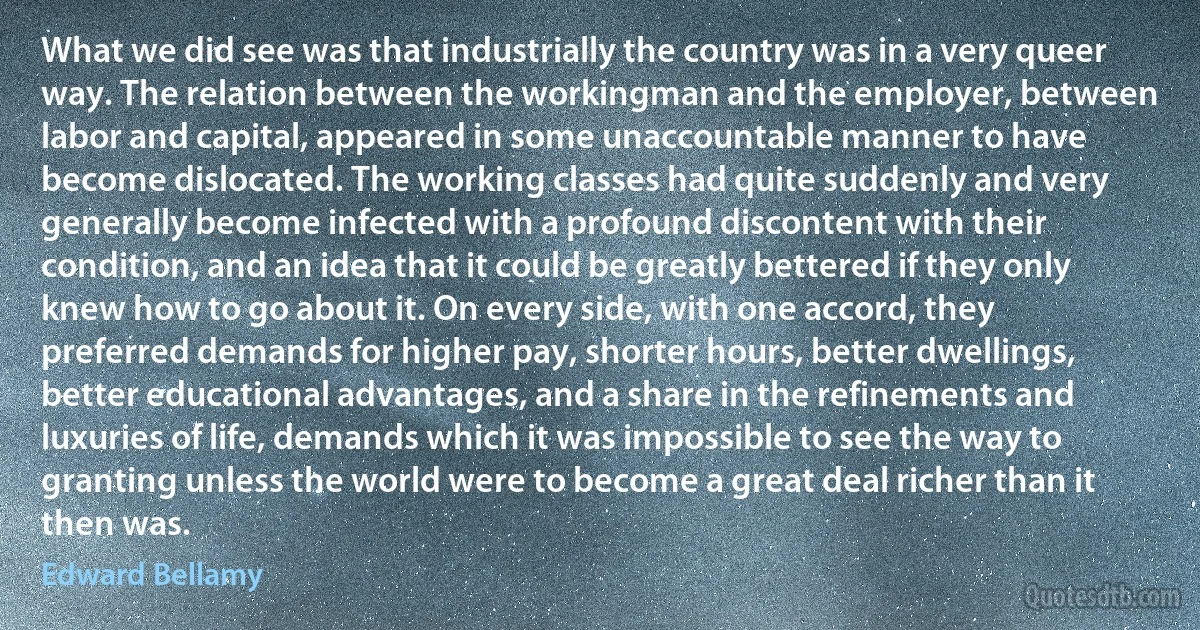
What we did see was that industrially the country was in a very queer way. The relation between the workingman and the employer, between labor and capital, appeared in some unaccountable manner to have become dislocated. The working classes had quite suddenly and very generally become infected with a profound discontent with their condition, and an idea that it could be greatly bettered if they only knew how to go about it. On every side, with one accord, they preferred demands for higher pay, shorter hours, better dwellings, better educational advantages, and a share in the refinements and luxuries of life, demands which it was impossible to see the way to granting unless the world were to become a great deal richer than it then was.
Edward BellamyRelated topics
condition country deal granting great hours idea impossible labor life pay quite see share side way working workingman world higherRelated quotes
To the biologist the problem of socialism appears largely as a problem of size. The extreme socialists desire to run every nation as a single business concern. I do not suppose that Henry Ford would find much difficulty in running Andorra or Luxembourg on a socialistic basis. He has already more men on his pay-roll than their population. It is conceivable that a syndicate of Fords, if we could find them, would make Belgium Ltd. or Denmark Inc. pay their way. But while nationalization of certain industries is an obvious possibility in the largest of states, I find it no easier to picture a completely socialized British Empire or United States than an elephant turning somersaults or a hippopotamus jumping a hedge.

J. B. S. Haldane
It is one of the most beautiful characteristics of Theosophy that it gives back to people in a more rational form everything which was really useful and helpful to them in the religions which they have outgrown... in this teaching as to the immortality of the soul and the life after death, Theosophy...does not put forward these great truths merely on the authority of some sacred book of long ago; in speaking of these subjects it is not dealing with pious opinions, or metaphysical speculations, but with solid, definite facts, as real and as close to us as the air we breathe or the houses we live in - facts of which many among us have constant experience - facts among which lies the daily work of some of our students, as will presently be seen.

Charles Webster Leadbeater
Traditionally, economic analysis treats the economic system as one of the givens. The term "design" in the title is meant to stress that the structure of the economic system is to be regarded as an unknown. An unknown in what problem? Typically that of finding a system that would be, in a sense to be specified, superior to the existing one. The idea of searching for a better system is at least as ancient as Plato's Republic, but it is only recently that tools have become available for a systematic, analytical approach to such search procedures. This new approach refuses to accept the institutional status quo of a particular time and place as the only legitimate object of interest and yet recognizes constraints that disqualify naive Utopias.

Leonid Hurwicz
I've lived, Sir, a long time, and the longer I live, the more convincing Proofs I see of this Truth - That God governs in the Affairs of Men. And if a sparrow cannot fall to the ground without his Notice, is it probable that an Empire can rise without his Aid? We have been assured, Sir, in the Sacred Writings, that except the Lord build the House they labor in vain who build it. I firmly believe this, - and I also believe that without his concurring Aid, we shall succeed in this political Building no better than the Builders of Babel: We shall be divided by our little partial local interests; our Projects will be confounded, and we ourselves shall become a Reproach and Bye word down to future Ages.

Benjamin Franklin
Let true Christians then, with becoming earnestness, strive in all things to recommend their profession, and to put to silence the vain scoffs of ignorant objectors. Let them boldly assert the cause of Christ in an age when so many, who bear the name of Christians, are ashamed of Him: and let them consider as devolved on Them the important duty of suspending for a while the fall of their country, and, perhaps, of performing a still more extensive service to society at large; not by busy interference in politics, in which it cannot but be confessed there is much uncertainty; but rather by that sure and radical benefit of restoring the influence of Religion, and of raising the standard of morality.

William Wilberforce
